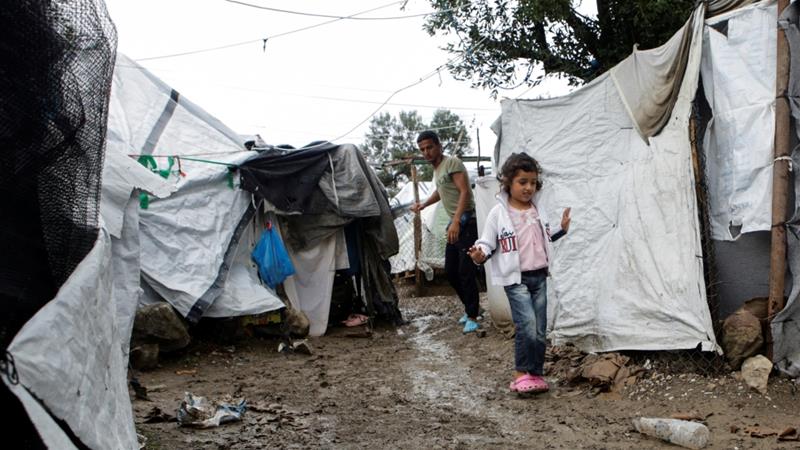
Europe is home to a grave humanitarian crisis – but Brussels looks the other way
In a Greek refugee camp, adults are being stabbed or raped, while children freeze. This suffering shames our continent
From Moria, we drove to what was once an army base, surrounded by olive trees. Approaching the site, we could see people walking on the side of the road. First a few, then a small crowd, then so many that we couldn’t drive any further. Getting out of the car to walk towards the campsite, I saw all kinds of faces: young faces, old faces, women with children, children without mothers, men with injuries.
Once I passed the official barracks that house officials from the Greek ministry of citizen protection, I was met with rows of tents, halls, housing made of plastic – it looked like a construction site. And then I became aware of the smell, the result of people crowded in small spaces with limited access to sanitation. Beyond the confines of the actual camp, there was even more chaos, with homemade tents and piles of garbage.
At night, I am told, the situation becomes worse. Women are being raped. Rather than using the communal washrooms, some women wear nappies so they can stay in their tents. And every night, someone is stabbed, someone’s property is stolen.
The lack of a proper processing system has created a state of dreadful limbo, where people live in horrendous conditions without an end in sight. Some have been waiting more than two years to receive news about their asylum application.
The doctors working in the camp, of which there are too few, tell me that the physical and mental repercussions are dire. People are living too close to each other for years at a time, often without enough food, or access to medical services and basic sanitation. This is a humanitarian crisis and it is happening on European soil. Standing in that camp, listening to people tell me their stories, I could not feel proud to be European.
How could I be proud to be European – or even worse, proud to be a European representative – when I am standing idly by while people are dying avoidably, right here in Europe? The very place that pledges to become a leader in digital technology is also the continent that allows people to starve and die only five hours from Brussels.
I got in the car and drove back to Mytilene. That night, 262 new migrants arrived just a few kilometres north of where I was staying.
The next morning, I spoke to the people who were there trying to help. Lawyers, doctors, students, gym instructors, bicycle mechanics. They had come from everywhere. They could help some with their most basic rights and needs, such as handing out nappies to women.
I felt helpless when they asked me what the plan was. Sometimes I thought about explaining how things work within the European commission, the parliament, or why member states couldn’t agree on a negotiation approach – but then I stopped.
They were asking me in the name of the boy who had died a week before from fever after being denied proper medical care; in the names of the 1,200 unaccompanied minors who were sleeping on the ground below the olive trees.
"The invisible violence of Europe's refugee camps"

"The invisible violence of Europe's refugee camps"
Read more
Negotiations can be tough, sure, but we manage to find agreement on things such as the EU budget. I accept that there are a number of possible solutions out there – some focused more on returns, some more on relocation. But I expect us to be honest, to comply with the laws and ethics of our continent. We must find short-term measures immediately, to meet the magnitude of the suffering. We should start with relocating the 1,200 unaccompanied minors freezing in the open right now.
As an old Greek adage goes, you can’t hide an elephant under a rock. And if we keep turning a blind eye to people dying, I have trouble seeing how us politicians can feel any pride in the offices we hold.
• Damian Boeselager is a German MEP and a co-founder of Volt, a pan-European party
No comments:
Post a Comment